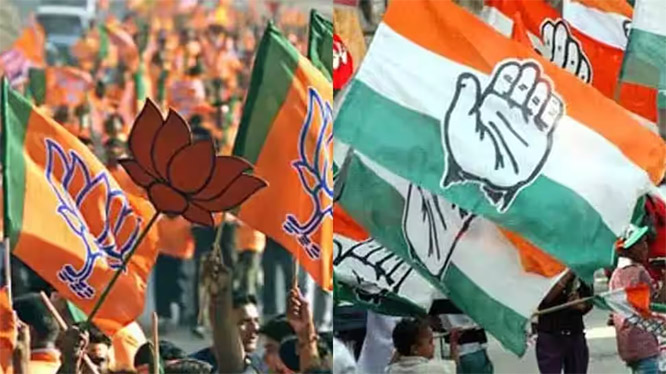Bengaluru: The Congress and BJP will lock horns on the electoral battleground again, in less than a year, in Karnataka as the stage is set for voting in the first phase in 14 Lok Sabha seats on Friday.
It's going to be a straight fight between the ruling Congress and the BJP-JD(S) combine unlike the Assembly elections in May last year which witnessed a triangular contest among the three parties.
The state has a total of 28 Lok Sabha constituencies. The second phase of polling in the remaining 14 seats is on May seven.
A total of 247 candidates -- 226 men and 21 women -- are in the fray for the first phase in most of the southern and coastal districts.
More than 2.88 crore voters are eligible to exercise their franchise in 30,602 polling stations where polling will take place between 7 am to 6 pm.
While the Congress is contesting in all 14 seats, BJP has fielded nominees in 11 and its alliance partner JD(S), which joined the National Democratic Alliance (NDA) in three -- Hassan, Mandya and Kolar.
Besides the three, the segments where elections will be held on Friday are: Udupi-Chikmagalur, Dakshina Kannada, Chitradurga, Tumkur, Mysore, Chamarajanagar, Bangalore Rural, Bangalore North, Bangalore Central, Bangalore South and Chikkballapur.
In the 2019 Lok Sabha polls, Congress and JD(S), which were in alliance and ruling the state then, had secured just one seat each in these 14 segments. The BJP had won in 11 and ensured the victory of a party supported independent candidate in Mandya.
Having scored a thumping victory in the Assembly elections, the Congress now appears determined to put up a strong show.
Karnataka is the most important state for the BJP in south India as it's only here that it had held power in the past. 'Its alliance partner JD(S) is fighting to remain politically relevant, after the Assembly poll drubbing,' a political analyst said.
The Old Mysore region is the Vokkaliga heartland and parts of it have been the traditional bastion of the JDS. However, the current elections are a battle for survival for JDS.
According to Karnataka Chief Electoral Officer Manoj Kumar Meena, 1.4 lakh polling officials will be on duty for the first phase.
Besides them, 5,000 micro-observers, 50,000 civil police personnel, 65 companies of Central Parliamentary Force and State Armed Police force of other States will also be deployed for security.
All the 2,829 polling stations of Bangalore Rural parliamentary constituency will be webcast, Meena said.
'This is as per the request of our returning officers and observers; so we have given more than double the Central parliamentary force for Bangalore Rural constituency. Seven companies of Central paramilitary forces have been inducted at the constituency since April 22,' he told reporters on Wednesday.
In fact, out of the total 30,602 polling stations in the first phase, 19,701 will be webcast, and 1,370 covered via CCTVs, he said.
Chikkaballapur has a maximum number of 29 candidates, followed by 24 in Bangalore Central, and Dakshina Kannada has the least number - nine.
JD(S) leader H D Kumaraswamy from Mandya, his brother-in-law and noted cardiologist C N Manjunath from Bangalore Rural on a BJP ticket, erstwhile Mysuru royal family scion Yaduveer Krishnadatta Chamaraja Wadiyar from Mysore, also from the BJP, and Deputy Chief Minister D K Shivakumar's brother and MP D K Suresh of Congress from Bangalore Rural, are among the prominent candidates in the fray in the first phase.
Also in the fray are BJP MP Tejasvi Surya from Bangalore South against Minister Ramalinga Reddy's daughter Sowmya Reddy of Congress, Union Minister Shobha Karandlaje on BJP ticket from Bangalore North against former IIM Bangalore professor M V Rajeev Gowda of Congress.
The Congress' performance in the elections, especially in the first phase which covers almost all Vokkaliga-dominated districts, is being seen as a big test of sorts for its state unit chief Shivakumar, who has made no secret of his ambition to become chief minister, amid speculations of change in guard mid-way of the Assembly term.
Stakes are also high for Chief Minister Siddaramaiah, as victory in particular in his home turf—Mysore and Chamarajanagar—is seen as key for strengthening hands, analysts say.
For the JD(S) and its state chief Kumaraswamy, the task is cut out -- to prove that the regional party is still a force to reckon with, particularly in the Vokkaliga dominated Old Mysuru or South Karnataka region.
Both Shivakumar and Kumaraswamy are Vokkaligas, and are engaged in a fierce turf war to consolidate their clout over the dominant community.
It is also seen as a kind of a 'litmus test' for state BJP president B Y Vijayendra, who has the onerous task of helping the party retain its supremacy in the Lok Sabha elections.
Ensuring a BJP sweep is paramount for the son of veteran leader B S Yediyurappa, to consolidate his position and silence critics who have questioned his selection for the post, overlooking seniors and seasoned hands.
The ruling Congress is mostly banking on the implementation of its populist five guarantee schemes. The BJP and JD(S) seem to be leveraging the 'Modi factor' to the hilt.








Comments
Add new comment